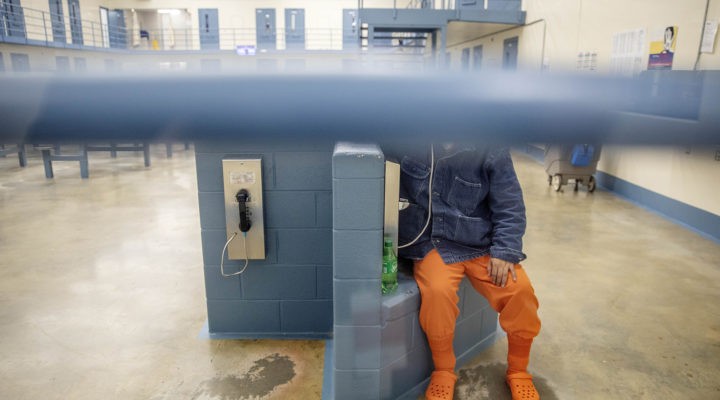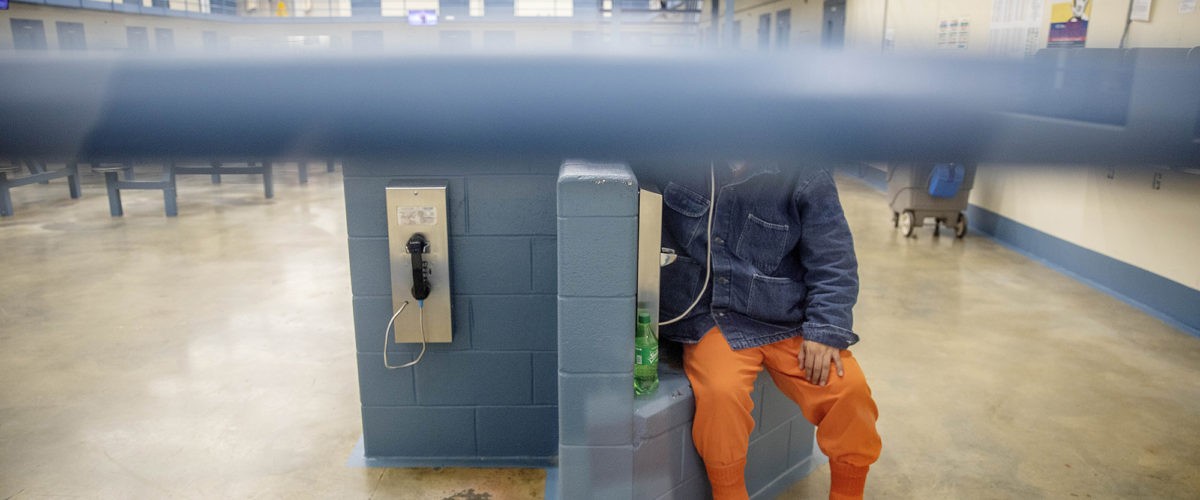Michael Wangai (not his real name) has been in U.S. immigration “detention” since August 2019. The only crime he has committed is seeking political asylum in the United States with a certainty that if he returns to his home country of Kenya, he will be killed.
Wangai was a member of the current ruling political party in his homeland. He witnessed corruption and bribery by top government officials, which he reported to authorities. He did so out of his deep Christian conviction and a belief in law and order.
Two other primary witnesses in the case were killed, and Wangai was arrested, taken into custody and tortured for three days. While later on a business trip to Singapore, Wangai received a message that he should not return home because he would be killed. He made the flight from Singapore to Dubai but out of fear did not board the next flight from Dubai to Nairobi. The driver who was to pick him up at the Nairobi airport did not know this and so went to the airport as planned.
The driver was gunned down as he drove away from the Nairobi airport without Wangai.
After more than a year in immigration detention — which is a fancy word for “prison”— a U.S. immigration judge recently ruled that Wangai is not eligible for political asylum because his torturers are members of the same political party as him. Wangai is appealing that ruling.
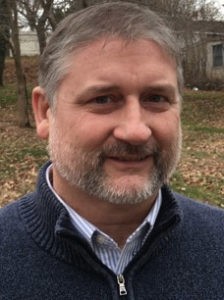
Ray Schellinger
That sums up what American citizens need to understand about the systemic flaw in U.S. immigration policies and practices, according to Ray Schellinger, global consultant for immigration and refugees for International Ministries of the American Baptist Churches in the USA.
Schellinger has devoted his adult life to serving refugees and immigrants in the name of Christ. He and his wife — an ordained Baptist minister like him but also a physician — currently are hosting another asylum seeker in their home while he awaits a court date. They wish Wangai could join them too.
Wangai’s journey to America
After fleeing home through Dubai, Wangai ended up in Tijuana, Mexico. That’s where he met Schellinger, at a ministry center run by Baptists there. Wangai is a lawyer who speaks seven languages. In Tijuana, he began working with African migrants to make sure their stories were understood by authorities.
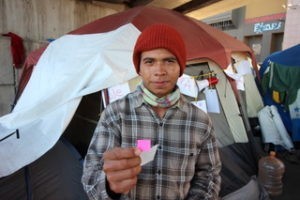 Eventually, Wangai’s own number came up to be processed into the U.S. immigration system. At all southern borders, asylum-seekers must wait months clutching to a small slip of paper with a number that indicates their place in line. Some bribe local officials to get moved up in the line, but even that still takes months because the Trump administration has so dramatically reduced the number of people who can be reviewed and processed each day.
Eventually, Wangai’s own number came up to be processed into the U.S. immigration system. At all southern borders, asylum-seekers must wait months clutching to a small slip of paper with a number that indicates their place in line. Some bribe local officials to get moved up in the line, but even that still takes months because the Trump administration has so dramatically reduced the number of people who can be reviewed and processed each day.
Wangai made his initial case for asylum, and he was deemed to have a strong likelihood of being able to provide “credible fear” of returning home, a key standard.
That was only a ticket into the detention center, where like all refugees and asylum-seekers who make it that far, he was tossed into the “icebox” — a bare concrete room kept around 51 degrees Fahrenheit. Often, immigrants are stripped of outer layers of clothing and given only paper or foil blankets to sleep on the cold floor for several days.
Welcome to America.
While being held at a detention center in Louisiana, Wangai applied for a habeas corpus ruling to be released from detention because the conditions were unsafe due to COVID-19, which had been brought into the facility by infected guards. Soon, he helped a group of 34 other African immigrants — Cameroonians, Ugandans, Ghanains and others — add themselves to the legal complaint.
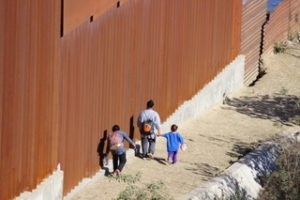 “The next thing he hears is, ‘Get your things packed, you’re leaving,’” Schellinger said. “They took him to a different facility, so his complaints about the other facility were negated. But it turns out that the next place is actually worse.”
“The next thing he hears is, ‘Get your things packed, you’re leaving,’” Schellinger said. “They took him to a different facility, so his complaints about the other facility were negated. But it turns out that the next place is actually worse.”
The warden of the new facility told Wangai he was moved “because you are a troublemaker,” a claim Schellinger finds outlandish. “He’s the one person who has never been in a fight. But I applaud him for making good trouble.”
In some ways, Wangai initially fared better than many others. When his case finally came before an immigration judge — the U.S. government always serves the role of adversary, arguing why each person should not be admitted to the country — the judge said his case sounded credible and required additional review. He thought that was good news.
Two weeks later, that same judge came back with what Schellinger called “every single circumstance to deny him,” most of which were technicalities. For example, he was told he didn’t apply for asylum in time, even though he was present in Mexico trying to apply but not allowed to apply because of the metering system imposed by Mexican officials in collaboration with U.S. authorities.
“The reasoning the judge gave to turn down his asylum was because he was being persecuted by a government official of a party in which he was also a member; it was a personal matter between two people.”
Wangai “has as good a case for asylum as anybody I’ve seen,” Schellinger said. “The reasoning the judge gave to turn down his asylum was because he was being persecuted by a government official of a party in which he was also a member; it was a personal matter between two people.”
Roadblocks in the Trump administration
While disappointed, Schellinger wasn’t surprised. “This is the way the Trump administration runs,” fueled in part by the hardline positions of Stephen Miller, special adviser to the president for immigration issues and the architect of administration policy on immigration.
“They are able to get away with this. The Trump administration put a couple of new policies in place soon after getting in office. One of those says if you are suffering from gang violence or domestic violence, that shouldn’t be considered. And neither, according to this judge, does this particular situation with attempts on his life, torture and persecution.”
The extreme anti-immigrant policies of the Trump administration are denying qualified people entry to the American melting pot, Schellinger asserted. “We have a system in place that wants to look first to find a reason to deny people asylum. Our government has been trying to eliminate the opportunity for any asylum seeker.”
Of Wangai, he said: “This is a man who because of his Christian principles could not let this corruption stand. He’s an amazing, wonderful person.” But his story is not compelling enough to allow him status in the U.S.
Schellinger’s own journey
 Schellinger has a perspective that few Baptist ministers have. After seminary, he lived and worked in Nicaragua for five years before being assigned to Tijuana for 15 years, mainly with an ABC domestic abuse recovery ministry called Deborah’s House. He arrived there shortly before 9/11, and quickly “began to see an incredible shift in attitudes in the U.S.”
Schellinger has a perspective that few Baptist ministers have. After seminary, he lived and worked in Nicaragua for five years before being assigned to Tijuana for 15 years, mainly with an ABC domestic abuse recovery ministry called Deborah’s House. He arrived there shortly before 9/11, and quickly “began to see an incredible shift in attitudes in the U.S.”
“I had a real strong relationship with many of the ministries working with migrants in Tijuana,” he explained. “Almost everybody we worked with in the domestic violence program were vulnerable, mainly migrants who ended up in Tijuana. My work began with that and then in 2015 International Ministries asked me — during that time of unaccompanied minors arriving — to organize a prayer vigil on the border.” That eventually led to a new role as global consultant on immigration and refugees.
Now he works with the ABC’s mission partners around the world to “welcome the stranger,” as Scripture commands, he said. “I have traveled around the world to see refugee camps and ministries. But Tijuana keeps calling me back.”
He’s now based outside Philadelphia but — before COVID — made frequent trips back to the border. And what he sees there now is significant change. It is not just Mexicans and residents of other Central American countries flowing toward the U.S., but now those heaving masses include Africans, Southeast Asians and many others.
A Russian’s story
One of those unlikely refugees he met in Tijuana is a Russian national who has been an ally of Russian opposition leader Alexei Navalny, who in August of this year was poisoned — allegedly on order of Russian President Vladimir Putin — while visiting Germany.
Well before that international incident, this man — whose name cannot be used for security reasons — was arrested in Russia for organizing several pro-democracy protests.
“He was persecuted,” Schellinger said in an interview as the man listened and affirmed from nearby in the same house. “They seized his bank accounts, put fines on him that are impossible to pay and that quadruple in severity. It’s years and years of wages. He saw the writing on the wall and got out. Unfortunately, he reached the United States a year too late.”
Like Wangai, he went through the “icebox” and then landed in the detention system for seven months. He was there until three weeks ago, when he was offered parole while awaiting his immigration hearing.
“Nobody else I’ve worked with in detention has been offered parole,” Schellinger said, wondering if the publicity surrounding Navalny’s poisoning gave him a higher profile.
American Baptists came up with the $10,000 bail to get the man out. “I sponsored him, so he’s living in our home,” Schellinger said. “He will be here for the foreseeable future. He hopes to get a work permit.”
You would think that a pro-democracy activist from Russia would be a top priority for asylum in the U.S., he noted. But that’s not the way things work in the current administration.
Militarization of theology
The whole process of immigration “has been made to be political when it is absolutely a theological issue,” Schellinger said. “For me it is a commandment in the understanding of my faith.”
“We have seen the militarization of our border and of our theology.”
But in the Trump administration, “we have seen the militarization of our border and of our theology,” he said. “We’re beginning to define people as enemies, as unlovable, as not the people God commands me to see as my neighbor.”
Within ABC churches, as is true in most faith groups in America, Schellinger’s biblical views are loved by half the constituency and hated by the other half, he said.
“When I was working with the domestic violence program, I found that even people who may have been guilty of intimate partner violence couldn’t say, ‘What you’re doing is a bad thing.’ You can’t come out publicly on the side of domestic violence.”
It is much easier, however, to come out against immigrants because of the perceived threat they bring to the U.S. The same people Baptists want to send missionaries to serve in other countries — if those same people cross a border to come into the United States, suddenly they are seen as criminals, Schellinger said. “Something about crossing a border has made them unlovable.”
Much of the criticism he hears, even from his fellow Baptists, is that immigrants who are undocumented have “done something illegal” and therefore must be punished.
“So many in our churches have asked the question, ‘Well, Jesus, who is my neighbor? It can’t be them. God’s not asking me to love these people.’”
What Schellinger has seen firsthand is that “the legal way is impossible. And this administration has done everything possible — with almost every month a new policy initiative — to limit the number of people who could make it here.”
‘The legal way is detention’
Taking the case of Wangai, who fled Africa, “the only legal way available was to pass through a half-dozen countries to get to Mexico and then to be put in detention. The legal way is detention.”
Schellinger has heard all the excuses Christians give for not wanting to welcome refugees and immigrants.
“A few years ago, in 2014, we had the beginning of this movement of unaccompanied minors reaching the borders. People were blocking the way of buses bringing children into where they could be cared for,” he remembered.
Their reasoning? “They are going to change the Christian character of our communities.”
 Schellinger’s retort: “If that is our reaction to a 6-year-old girl who crossed the border trying to find a way to live, then the Christian fabric of our communities has been lost already.”
Schellinger’s retort: “If that is our reaction to a 6-year-old girl who crossed the border trying to find a way to live, then the Christian fabric of our communities has been lost already.”
Often critics will tell him, “You’re just saying this because you’re anti-Trump.”
He replies: “I started long before 2016. I was appalled to hear Trump’s initial characterization of the people I’ve worked with so long. But the truth is, these things didn’t start with him. We’ve had a broken system from long before.”
That brokenness extends to U.S. policies that make life south of the border untenable, he added.
“When NAFTA was first signed, there were 2 million undocumented workers in the U.S. That increased to 12 million. We’ve had this attitude toward undocumented people that has kept them living in fear and in the shadows while we continue to exploit their labor. … We’ve been listening to the worst angels of our nature.”
Charting a better path for U.S. immigration
There is a better way, Schellinger believes. But that way requires comprehensive immigration reform — something neither Republicans nor Democrats in Congress have been willing to tackle.
“First, when it comes to undocumented labor in the U.S, we heavily punish those who are caught working without papers. If we really wanted to tackle that problem — and I think it’s a problem because people are being exploited — there is an easy solution that would finish the issue in a matter of weeks or months. That is to begin to punish the companies or individuals who hire them.”
When immigration police raid businesses to round up illegal workers for deportation, the businesses and business owners who knowingly hired them are not sanctioned, he explained. “We make it possible for them to continue to pay the lowest price possible, and they immediately refill those positions.”
“We would have a change in the law in weeks because as soon as we as consumers saw our prices for vegetables go up, we would demand a change.”
If the businesses and owners were held to account, “We would have a change in the law in weeks because as soon as we as consumers saw our prices for vegetables go up, we would demand a change. We need these 10 to 12 million people in the country.”
Second, “we have to rewrite our immigration laws,” Schellinger said. “There are so many contradictions in it. In some instances, it penalizes you the longer you’ve been in the U.S. But in other instances, the longer you’ve been here it might give you preference. The laws are archaic. It is one code placed on top of another.”
Third, “if we don’t want people to stay undocumented, we need to create a legal pathway for them and decide how many we will take. We were the leaders in the world in refugee resettlement until four years ago. We had the best system of anyone. We were accepting 130,000 people a year, and now that number is going to be less than 15,000. This administration wants to zero it out.”
Fourth, “the asylum process actively punishes people who apply for asylum. That’s something we could change easily. We could make sure we’re not treating people who deserve justice and welcome as criminals before they even come.”
Related articles:
Faith-based groups unite to denounce Trump’s further gutting of legal refugee resettlement
Despite Trump crackdown, Americans still positive toward immigration
We must not look away from 8,800 expelled immigrant children
400 faith leaders ask Trump to end immigrant family separations

